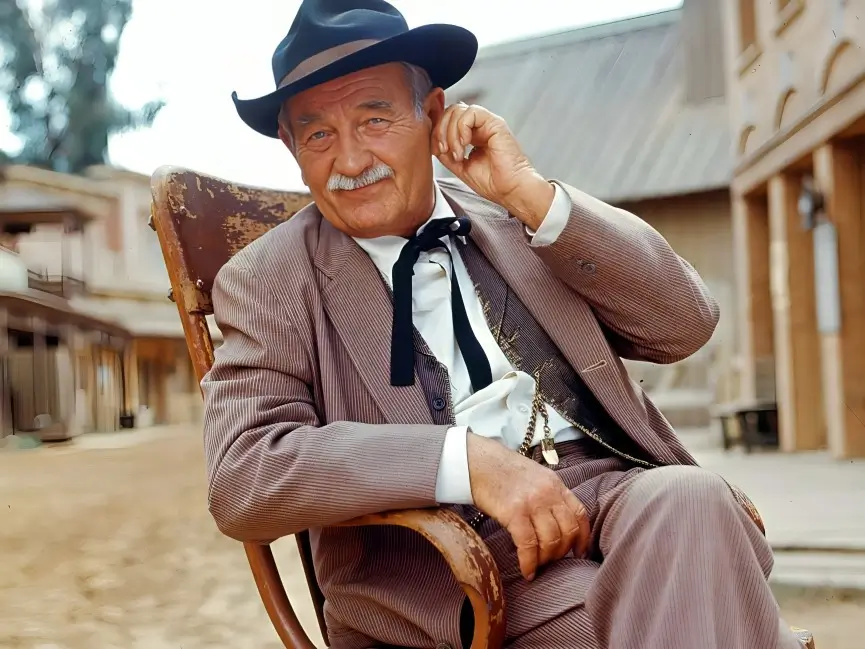Milburn Stone: Biography, Age, Height, Net Worth, Movies & TV Shows
Published: April 28, 2024

| Born | July 5, 1904 · Burrton, Kansas, USA |
| Died | June 12, 1980 · La Jolla, San Diego, California, USA |
| Age | 75 Years |
| Height | 5' 8" |
| Spouse | Jane Garrison (1946–1980), Jane Garrison (1939–1940), Ellen Morrison (1925–1937) |
Early Life and Background
Milburn, born Hugh Milburn Stone in Burrton, Kansas, on July 5, 1904, seemed destined for the stage from an early age. His uncle Fred Stone, a Broadway comedian, may have influenced young Milburn with his charisma and talent. His family's connection to performance spurred his interest in performing.
Milburn was a well-rounded high school student in Burrton. Though drawn to the spotlight, he actively participated in different activities. He explored acting in the drama club, improving his skills and getting stage experience. On the basketball floor, he showed his competitiveness and togetherness. Milburn also sang in a barbershop quartet, exhibiting his musical talent and harmony appreciation.
This period saw a fascinating turning point. Milburn received an invitation to the US Naval Academy. The approach may have led to an organized and respected career serving his country. However, the stage was too tempting. Milburn pursued his acting dream with tenacity. He chose theater over military service, a decision that would influence his legacy.
Education
The details of Milburn Stone's formal education after high school are unknown, although his high school years provide crucial information. His diverse activity in drama club, basketball, and a barbershop quartet implies a solid foundation from childhood.
Drama club was crucial. Milburn trained there for acting. He presumably learned stage presence, projection, character development, and delivery here. These qualities were his foundation for success. He may have performed in school plays or neighborhood performances to improve his stage presence.
The rest of his education is unknown. Did he continue his education beyond high school? Did he take any acting classes or workshops outside of school? He may have attended a collegiate drama program, but without proof, it's hard to determine.
Milburn has inherent skill and a great work ethic. His high school extracurriculars show a commitment to self-improvement and a desire to master acting talents, even though his formal schooling was more general. His talent and foundation propelled him to a tremendous career.
Career Beginning
Milburn Stone didn't become famous immediately. It originated on the lively and often difficult vaudeville stages. Young and ambitious Milburn joined "Stone and Strain." in the late 1920s. Vaudeville trained performers to be quick, adaptable, and able to captivate audiences with a variety of skills. Milburn improved his comedic timing, stage charisma, and audience connection here. These skills would let him deliver clever lines on Broadway and play complex characters on movie.
Milburn rose in theater in the late 1920s and early 1930s. He got Broadway gigs by 1934 due to his talent. The film "Jayhawker" showed his acting range and developing fame. Milburn worked with famous performers and directors on Broadway, a more prominent platform than vaudeville. This exposure improved his craft and prepared him for Hollywood's brighter lights.
However, the silver screen was too tempting. Milburn's attention shifted to filmmaking in the 1930s. Hollywood offered national acclaim and lasting celebrity. Milburn was ready to move from vaudeville and Broadway to the big screen with a firm foundation.
Milburn Stone Movies and TV Shows
Milburn Stone's cinematic career was a continuous increase of versatility and determination. He appeared in serials, the precursors to television, in the 1930s. These fast-paced, episodic adventures gave budding actors vital experience. The "Tailspin Tommy" series, based on the iconic comic strip, may have helped Milburn master action heroes and serialized storytelling.
He appeared in feature films, demonstrating his versatility. Historical dramas like "Young Mr. Lincoln" (1939) let him play Stephen A. Douglas. Comedies allowed him to show off his timing. This tendency persisted in the 1940s. He could be a head busboy in a screwball comedy or a clever radio columnist. Milburn's versatility and willingness to play varied characters made him a trusted character actor.
However, 1955 changed Milburn's career. New western TV series "Gunsmoke." cast him after an audition. That character? "Doc" Adams, the friendly but tough frontier doctor. Milburn worked hard to give the character integrity, sympathy, and dry humor. His performance appealed, and "Doc" Adams became synonymous with Milburn Stone.
Milburn was a "Gunsmoke." staple for 20 years. Fans and colleagues respected him for his dedication to the job and historical accuracy. After 20 seasons, "Doc" Adams ruled Dodge City's chaotic society. Milburn's continuous commitment to communal well-being cemented his place in television history.
Milburn never gave up filmmaking, even if "Gunsmoke" defined him. He continued to feature in movies during his time on the show, showing his dedication to his art and drive to explore new roles and stories.
Milburn Stone was a versatile actor who took use of every opportunity in film and television. His history as a Hollywood jack-of-all-trades spans vaudeville, the silver film, and the golden age of television.
Milburn Stone Net Worth
The net worth of Milburn Stone, who excelled before modern television's excessive salary, is difficult to calculate. Since he died in 1980, no official sources report his net worth. Considering his career, we can make some reasonable guesses.
"Gunsmoke" was a cultural phenomenon for 20 seasons. A long-running position on a successful series gave financial security, even though actor salaries were lower in the 1950s and 60s. Additionally, Milburn's career-long film performances would have increased his income.
These factors suggest Milburn Stone was well-off throughout his lifetime. His work achievements suggest he lived comfortably and left a safe legacy for his family, however an exact financial figure is unknown.
Personal Life & Philanthropy
Milburn Stone's life revolves around family and his work. He married 3 times. Ellen Morrison was his first wife from 1925 till 1937. The 1939 relationship with Jane Garrison lasted a year. He found permanent love with his third wife, Jane Garrison (not related to his first wife), in 1946. Milburn's 1980 death ended their happy marriage.
Milburn's official philanthropy is unknown, but his community and responsibility are evident. His commitment to acting, especially as "Doc" Adams, is remarkable. "Doc" Adams was kind, honest, and dedicated to others. Milburn may have shown his social responsibility through his art because these attributes resonated with him.
He may also help good causes due to his extensive entertainment career. He may have held charitable events or raised awareness for critical causes. It's hard to say without proof. Given the principles he portrayed on television and "Doc" Adams' legacy, Milburn Stone certainly had a sense of obligation beyond the stage and screen.
Legacy
Doctor "Doc" Adams, a tough but caring frontier doctor, is part of Milburn Stone's legacy. He portrayed the character on "Gunsmoke." for over two decades. In Dodge City's lawless environment, his performance was about morality as well as acting. "Doc" Adams' compassion for the neighborhood made Milburn Stone famous.
Beyond audience engagement, Milburn's craft passion merits recognition. He was recognized for his painstaking preparation and historical correctness on "Gunsmoke." This sincerity garnered him peer respect and cemented his status as a television icon. He changed audiences' views of western doctors beyond the broadcast.
In 1981, the National Cowboy and Western Heritage Museum recognized Milburn posthumously into its Hall of Great Western Performers. This renowned award recognizes his lasting impact on western music.
The Milburn Stone legacy goes beyond prizes and accolades. The longevity of "Gunsmoke" assures that fresh audiences find his portrayal of "Doc" Adams. Milburn certainly possessed compassion, honesty, and unflinching community service, which the character represents. Since "Doc" Adams impacted so many people, Milburn Stone's legacy lives on in television archives and in their hearts.
Conclusion
Milburn Stone's life and work are fascinating. From his humble beginnings in Kansas to his success as an actor, his career shows constant passion and determination. His legacy lives on among fans of "Doc" Adams, even though his name may not trend on social media.
Milburn's performance went beyond entertainment. Even in the Wild West, "Doc" Adams symbolized integrity and dedication to others, reminding us of these eternal qualities. New generations will discover Milburn Stone's legacy because to his fame.
Milburn Stone's story inspires performers and dreamers. His story shows that success requires hard work, devotion, and quality. Despite his social media absence, his influence on television and popular culture is apparent. Milburn Stone's legacy shows how storytelling and a well-developed character can persist.









